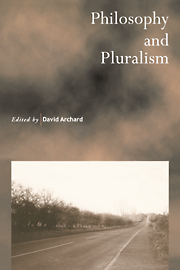Book contents
- Frontmatter
- Contents
- Notes on Contributors
- Introduction
- Philosophy in Different Cultural Contexts
- A Case for Philosophical Pluralism: The Problem of Intentionality
- William James, ‘A Certain Blindness’ and an Uncertain Pluralism
- Cultural Realism: the ancient philosophical background
- Religion and Pluralism
- A Single True Morality? The Challenge of Relativism
- Pluralism, Realism and Truth
- Value-Pluralism
- Moral Philosophy and its Anti-pluralist Bias
- Coping with the Many-Coloured Dome: Pluralism and Practical Reason
- Rawlsians, Pluralists, and Cosmopolitans
- Political Liberalism, Secular Republicanism: two answers to the challenges of pluralism
- ‘Race’ in Britain and the Politics of Difference
- Tragedy, Moral Conflict, and Liberalism
- References
Tragedy, Moral Conflict, and Liberalism
Published online by Cambridge University Press: 30 October 2009
- Frontmatter
- Contents
- Notes on Contributors
- Introduction
- Philosophy in Different Cultural Contexts
- A Case for Philosophical Pluralism: The Problem of Intentionality
- William James, ‘A Certain Blindness’ and an Uncertain Pluralism
- Cultural Realism: the ancient philosophical background
- Religion and Pluralism
- A Single True Morality? The Challenge of Relativism
- Pluralism, Realism and Truth
- Value-Pluralism
- Moral Philosophy and its Anti-pluralist Bias
- Coping with the Many-Coloured Dome: Pluralism and Practical Reason
- Rawlsians, Pluralists, and Cosmopolitans
- Political Liberalism, Secular Republicanism: two answers to the challenges of pluralism
- ‘Race’ in Britain and the Politics of Difference
- Tragedy, Moral Conflict, and Liberalism
- References
Summary
The central question of this paper is how modern liberal political theory can understand and make sense of value pluralism and the conflicts upon which it is premissed. It is a commonplace that liberalism was born out of conflict, and has been partly characterised ever since as a series of attempts to accommodate it within the framework of the nation state (Lukes, 1989, p. 139). However, it is also true that liberals have proposed many different routes to the resolution, or containment, of conflict, and these different routes are manifestations of different understandings of conflict itself both within an individual life and between lives. Thus, some assert the irreducible heterogeneity of value: John Stuart Mill famously inveighs against the attempt to model all human life on a single pattern and tells us that ‘human beings are not sheep, and even sheep are not indistinguishably alike. A man cannot get a coat or a pair of boots to fit him unless they are either made to his measure or he has a whole warehouseful to choose from; and is it easier to fit him with a life than with a coat?’ (Mill, 1978, p. 133). On Mill's account, plurality is the natural (and indeed desirable) condition of humanity. We should neither hope for nor expect the elimination of conflict, and a world in which there is diversity is richer and better for it.
- Type
- Chapter
- Information
- Philosophy and Pluralism , pp. 191 - 202Publisher: Cambridge University PressPrint publication year: 1996
- 2
- Cited by

